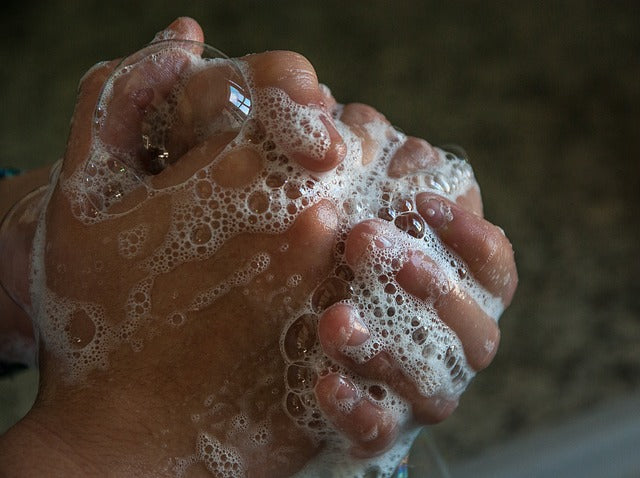
Hand dermatitis or hand eczema is one of the most disabling and common conditions. It makes hands dry, itchy, scaly, cracked and can be painful. Sometimes, it can cause small & itchy blisters.
Hand eczema or dermatitis can be seen in people of all professionals, and it is especially debilitating in nurses, doctors and healthcare workers.
The prevalence of hand eczema in nurses, doctors and healthcare workers is much higher when compared to the general population. A study published in July 2017 in the British Journal of Dermatology showed that 30% of healthcare workers suffered from hand eczema in a 1 year period.
Dealing with hand eczema can be debilitating for anyone, especially for healthcare workers. This skin condition causes significant discomfort, itch, and pain. It can interfere with daily activities. The simple act of washing hands, picking up a dish or opening a door can be uncomfortable or even painful.
Aside from physical discomfort, most people with hand eczema are self-conscious and may become even embarrassed about the conditions of their hands. They worry about what other people think of their hands. Is it contagious? Some people are so bothered by their hand dermatitis, they don’t even want to shake other people’s hands.
These physical and emotional burdens become severe, forcing some to take an extended leave of absence just to heal their hands.
In some extreme cases, people have been forced to change their profession.
Imagine you have trained your whole life to pursue the career of your dream, such as a healthcare provider, but your career may come to a halt because of this skin condition.
There are a number of precautions you can take to prevent and treat hand eczema.
We will discuss the common causes of hand dermatitis and triggers that make this disease worst. More importantly, we will describe 10 steps to prevent hand eczema and 4 steps to treat this condition.
#1 common cause of hand eczema:
The number one cause of hand eczema is frequent hand washing. Healthcare providers are required to wash their hands frequently because it is one of the most effective steps to prevent the spread of infection or disease.
In one study, 30% of the participants reported handwashing with soap more than 20 times a day at work. A total of 45% of the participant used hand disinfected more than 50 times a day.
That is a lot of hand washing!
Continuous and excessive exposure to water, especially hot water, can remove all the protective lipids and oils from the outer layer of the skin. The use of soap and other harsh cleansing agents, such as alcohol, can strip away the protective oils and lipids.
Collectively, all the hand washing destroys the skin barrier, making the skin excessively dry and less pliable. This leads to the formation of cracks and fissures in the skin, which in turn expose skin to various irritants or allergens.
A vicious cycle is created. The allergens or irritants trigger inflammation, which leads to further break down of the skin barrier. Before you know it, you have a major flare of hand eczema.
Other Causes for Hand Dermatitis:
Latex or non-sterile gloves are essential in the hospital or clinical settings. They are used to protect healthcare workers and their patients from germs, chemicals, and other dangerous substances.
In the same study published in the British Journal of Dermatology, 54% of the responders stated that they use non-sterile gloves for longer than two hours each day.
Unfortunately, there are individuals with true allergy to latex, rubber additives, preservatives or color dyes in the gloves. Wearing gloves every day can trigger an allergic reaction and bring on a hand eczema flare for these individuals.
Wearing gloves for a prolonged period can also trigger hand dermatitis in individuals who do not have a true allergy.
How can this happen?
When your skin has intact skin barrier and a healthy level of lipids, you can prevent limit the level of the latex, allergens or irritants passing beyond the stratum corneum layer of the skin. So the exposure level to these irritants is very low, and do not trigger any inflammation. However, after excessive and frequent hand washings, the skin barriers are weakened and breached. Now your skin is open and exposed, which allow a higher level of irritants penetrate and reach the inner layer of the skin. This can trigger an inflammation and lead to a flare of hand dermatitis.
What we just described is two-part phenomenon – allergy vs. irritant. This is a subtle but important point in the management of hand dermatitis.
If you have a true allergy, a contact allergic test can identify the allergic chemical, when your doctor performs a patch test by placing a panel of chemicals on your back. However, if you have an irritant reaction, the patch test will not identify the chemicals.

10 Tips to prevent hand eczema
Now you know about the causes. What can you do to prevent it? Here are some helpful tips to prevent hand dermatitis.
1. Reduce the frequency and exposure to water. This is perhaps the easiest but difficult task for healthcare providers. As stated above, frequent and excessive washing is the leading cause of hand dermatitis. Obviously, if you can reduce the length and frequency of hand exposure to water, you can prevent the severity and the frequency of hand dermatitis.
You may not be able to reduce the frequency of hand washing at work, but you can limit the duration of each hand washing.
Also, you can reduce exposure to water at home. For example, use a dishwasher to wash dishes. Reduce the frequency and time you spent in the shower. Ask your family members to wash the fruits and vegetables.
2. Do not use hot water. Only wash hands with warm or lukewarm water. Hot water can really strip away the natural lipids and break down the skin barrier.
3. Wash hands with hand disinfectants, instead of water and soap. In the same study published in British Journal of Dermatology, use of hand disinfectant was not associated with self-reported hand eczema.
However, it is important to remember that nearly all hand disinfectants are made of alcohol. They can also dry up your hands quickly. So use less per application.
4. Use bar soap, such as Dove. These soap are more gentle than liquid soap. They are not as harsh in stripping away the natural lipids. Avoid soap with label claim “antibacterial.”
5. Carry a bottle of moisturizers (e.g., small sample sized product) in your pocket and apply it immediately after each hand washing. Apply ample amount of lotions, creams or ointment to both hands.
If you have normal skin, use light lotions. If you have dry, cracked hands or the beginning of hand eczema, you may want to use thick creams, ointment or balm.
6. Look for moisturizers that are fragrance-free. Products with fragrances make it pleasant to use but fragrances can irritate the skin. Also, look for moisturizers that contain ceramides. They are essential in helping to rebuild the skin barriers.
7. Consider applying pure natural oils to hands. Natural oils have antioxidants, polyphenols, vitamin E. They can be very nourishing to the skin. Also, most of the oils can be readily absorbed quickly to the dry skin.
8. Protect your hands with warm gloves when at outdoor, especially in the winter. Cold air has low ambient moisture level, and also cold temperature dries out the skin quickly. Wearing gloves prevent the harsh weather elements from doing further damage to your hands.
9. In case, you have to clean or decontaminate a dirty or soiled area with harsh chemicals, be sure to double gloves (i.e., wear 2 layers of gloves). If you have medium sized hands, put on the medium sized gloves first, and then overlay it with larger sized gloves.
Also, it may be helpful to apply a thin layer of moisturizer before putting on the gloves.
In case any of the chemical agents spilled to your hands, be sure to wash it off thoroughly with water.
10. Pay close attention to any early fissures or cracks on your hands. Really apply layer and layer of thick ointment or balm to these areas. If the fissures are deep and wide, you can try applying glues to these areas to provide an artificial layer of protection.
4 Tips to treat hand eczema
1. If you have a full flare of hand eczema, moisturizer alone is not going to be enough. You need to shut down the underlying inflammation by applying high potency steroids along with thick moisturizers (ie., ointment or balm).
Do not use moisturizers that are lotion or creams, because they have surfactants, emulsifiers, and preservatives. These agents can irritate the skin causing stinging, pain and worsening the hand dermatitis.
Also, limit the frequency and duration of steroids use to the hands. If you notice the hand eczema is improving, slowly taper the steroids, meaning use less amount and apply less frequently.
2. Before going to sleep, soak hands in lukewarm water to soften the skin a bit. Pat the hands dry with a towel. Do not rub the hands vigorously with the towel. Do not over dry it either.
Apply a thick layer of ointment or balm to coat the whole hands. Wear cotton gloves to bed. This combination traps the water, moisture and natural lipids/oil to hands.
3. Consider getting a patch test to make sure you have no new allergies.
4. Watch out for potential infection. If your hands are red, swollen, or hot to touch, you may have an infection. Consider seeing your physician as you may need antibiotics.
Final Thoughts:
Hand eczema can be a debilitating condition for healthcare workers. The leading cause is excessive hand washing, and we just listed 14 steps you can do to prevent and treat this condition. If you know someone who has hand dermatitis or hand eczema, be sure to share these tips with them. Also, let us know what effective strategies you have to deal with hand eczema.






This article really helped me to understand what I have been experiencing with my hands for the past 6 years now. It’s very true that this condition does play on your mind emotionally n mentally as well. I’m always embarrassed anytime I have a flare up because it gets very bad and I hate for others to see my hands in that condition. I was a hair stylist for years and I’m now having to give up on it because touching hair or any hair products irritates it so badly and I didn’t want the customers that I had to feel like I was transferring it to their hair. Right now my hands are completely irritated and swelling and it’s making it very hard for me to work because it hurts so bad. Is there any type of hand cream that can help me out?
I’ve heard that intensive use in a sauna can help. I’m going to try that and leave an update. Mine has progressively gotten worse over the years. I’m 42. When it “flares up” it’s usually after a major dietary change like going to a bbq and drinking a ton of beer and eating hot dogs. Also if I expose my hands to harsh chemicals like hand sanitizer or bathroom cleaner.
This message was very helpful, i get it real bad my hands swell and look like they were slashed with a razor blade,very painful ,very itchy, and lots of skin peeling off , i lost 2 years of work ,i worked in nursing, then it cleared up ,for about 2 years and now it is back, lucky i am retired . Spent a lot of money on creams etc. Hard to do anything when they flare up, my hands are very sensitive now that when i am cooking it is painful to slice onions, etc without gloves as my hands burn and sting even when it cleared up.
Great Article…Any recommendations on an over the counter steroid or even prescription? My hand Eczema is quite severe…cortisone doesn’t cut it…
Eczema on the hands is hard emotionally to cope with. You can hide your eczema on every part of your body apart from your hands and face. I know I suffered at school with the embarrassment of it.
Great article. Bringing awareness of eczema on the hands,